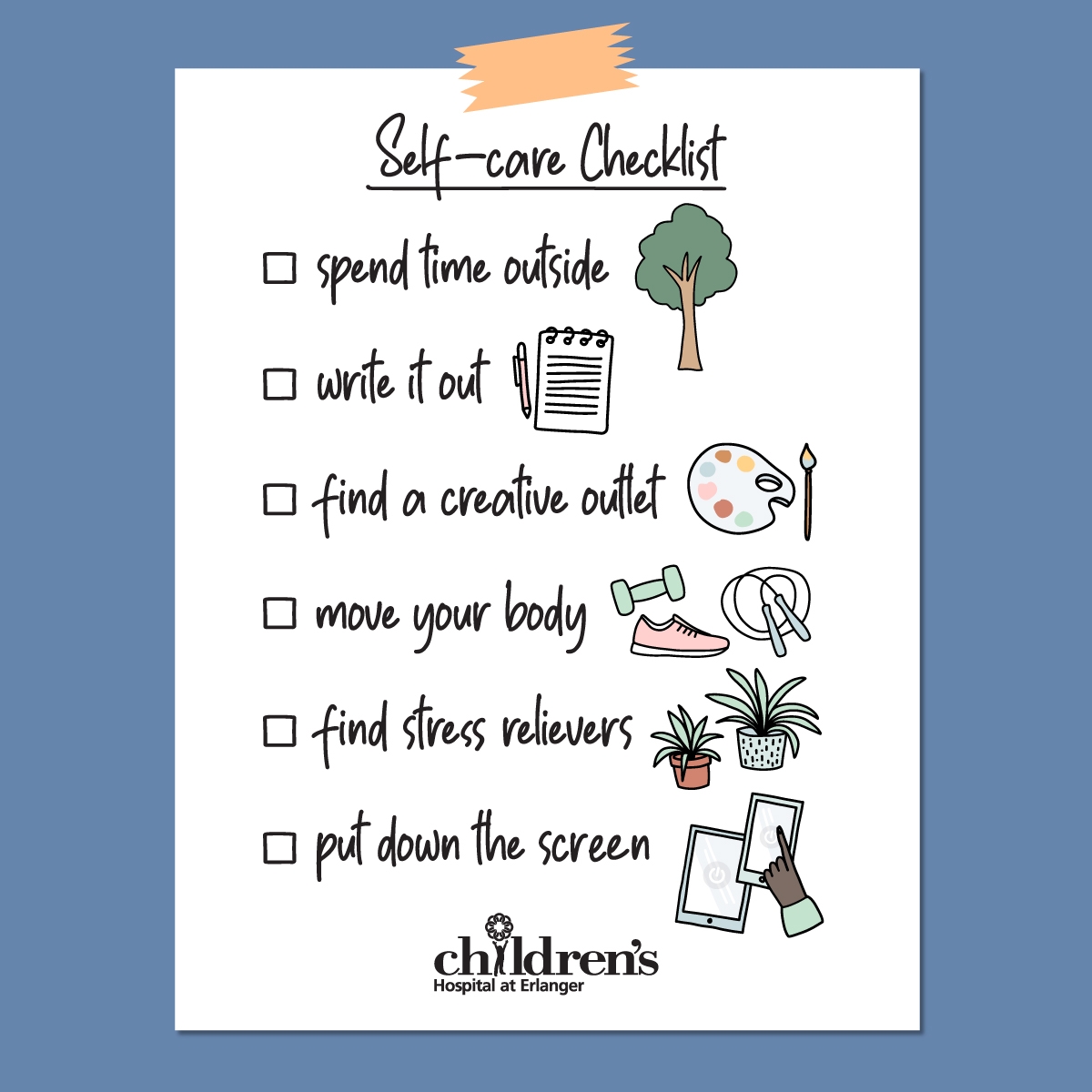When it comes to kids and teens, the impact of the COVID-19 pandemic on their mental health should not be overlooked. Decreased social interaction with their peers and extended family, disruption in school or summer routine, and frustration over changes to future plans – these could all be contributing factors to your child feeling anxious, depressed, or isolated.
 In fact, loss of routine and uncertainty about the future can be a big source of stress for both parents and kids, so it’s important that everyone in the family continue to practice self-care. A lot of times, we try to overthink self-care. But at its root, self-care is simply about taking time to recognize our own individual needs and then taking time to care for them.
In fact, loss of routine and uncertainty about the future can be a big source of stress for both parents and kids, so it’s important that everyone in the family continue to practice self-care. A lot of times, we try to overthink self-care. But at its root, self-care is simply about taking time to recognize our own individual needs and then taking time to care for them.
Like most healthy lifestyle habits, caring for yourself is a lesson best learned when you’re young. And, with so much confusion happening in the world and in our lives, now is the perfect time to begin teaching your kids about why self-care is an important part of health and wellness.
But what does self-care look like for kids and teens? Let’s break it down.
These tips are brought to you by our partners at Children’s Hospital at Erlanger.
Why Self-Care Is Important For Kids
Self-care is important for kids for many of the same reasons it is important for adults. While kids aren’t usually caring for the needs of others — and prioritizing others over themselves — they are subjected to stress, just like adults.
Regularly taking time to focus on things that are solely for the individual is important. Learning self-care habits including healthy eating habits, regular physical activity, a consistent sleep schedule, and limited screen time can help kids to ease stress, boost their mood, experience better self-esteem and confidence, and make healthy choices throughout their lives.
What Self-Care Looks Like For Kids & Teens
So, self-care is important for kids. But what exactly constitutes self-care in kids and teens?
Well, the first thing to consider is that self-care is not all about manicures or spa days. It’s not even about huge gestures or ways to “treat yourself.”
Instead, it’s quite simply about caring for yourself. To help your child appreciate the full benefit of their new self-care practice, encourage them to find activities and behaviors that help fuel their unique fire and give them life.
 Here are a few ideas:
Here are a few ideas:
- Spend time outside. This was commonplace for kids even a decade or two ago. We spent tons of time playing outdoors. But it’s less common today, and that can come at a cost. Kids can benefit greatly from time in the Great Outdoors. Nature has been shown to have a calming effect on our minds and bodies, so send your little ones outside when it’s possible — or go outside with them!
- Write it out. Did you have a diary when you were growing up? A journal, or diary, is a great place to write out emotions and complex feelings that are experienced as a kid or teen. What your child writes doesn’t have to be long or complicated, but it can be! Or it can be as simple as taking time regularly to jot down things he or she is thankful for.
- Find a creative outlet. For some kids, the journaling mentioned above might be a creative outlet. Future writers who love to create with words may find that the perfect fit. But all kids can benefit from finding some way to express creativity — whether that’s painting, drawing, building, doing arts and crafts, or playing a musical instrument. In some cases, your child may even find that creative outlet in the kitchen, cooking or baking up a storm.
- Move the body. We don’t often think of exercise as a form of self-care, but it may be the biggest way possible to care for yourself. Kids need at least 60 minutes of physical activity each day, and many of them don’t get that. Help your child find a form of exercise that he or she enjoys. For kids, that may involve active playtime, while for teens, it may include a game of pickup basketball or lifting weights at the gym.
- Find stress relievers. While all self-care activities can essentially be called stress relievers, some activities are more calming than others. Your child or teen may benefit from meditation or yoga, so you may want to share the basics of each. But for some people, the best stress relief activity is sitting in silence. It doesn’t have to be for long — but that bit of solitude can do a world of good.
- Put down the screen. We live in a technology world. But we can all benefit from a little less time with a screen. Teach your kids about the benefits of having a digital detox every once in a while, and talk about why spending time doing non-screen activities can be fulfilling. Besides, less time with a screen leaves more time for the other ideas outlined above!
















